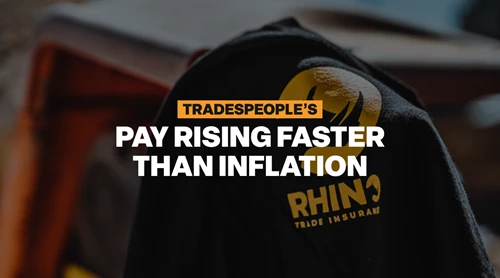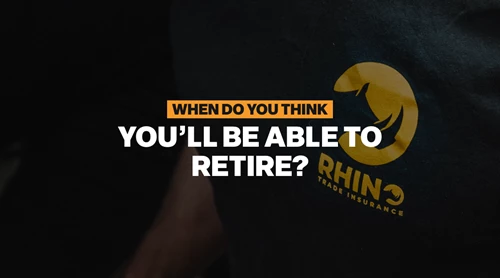
Tradespeople's Pay Rising Faster Than Inflation
Tradespeople’s pay is rising faster than inflation. Learn what’s behind the increase, which trades earn most, and how Rhino can help protect your business and income.
Here’s a personal question for you. It’s OK – this one’s just between us. Do you have at least six month’s income stashed away, enough to cover the rent or mortgage, bills and life’s essentials should you find yourself without a wage?
Yes, we know. You’re confident and capable, and it’d take hell or high water to stop you delivering your jobs. But seriously, how would you cover your basic expenses if your luck ran out? You can always rely on Rhino to be real, so let’s talk about it.
As a tradesperson, you’re probably used to planning for inconsistencies in demand. Depending on your specific trade, it could be seasonal surges (like gardeners making hay while the sun shines) or dry patches (for example, July isn’t the best month for heating engineers).
If you’re sensible, peaks and troughs in income will be a factor in your financial planning for the year. Drawing up a basic budget based on a forecast of your expected income fluctuation will help create a buffer, protecting you from the worst of the financial dips. Most of it is common sense – for example, don’t pay yourself a salary from your business based on your most profitable month, instead use your leanest month as a basis. Otherwise, it’s advisable to try to get some savings in place so that you can weather those leaner months without running out of cash (and ideally have the budget for some capital purchases, e.g., new tools or vehicles, when you really need them).
Most tradespeople at least partly diversify their offering to keep them ticking over all year round. For example, smart housepainters might do inside jobs (painting interiors, that is, not turning to crime) during the winter to keep the money rolling in. Other trades might find it more difficult. Have you ever wondered where ice creams vans go in the winter? Us too. Answers on a postcard to Rhino HQ.
But planning is one thing. But what happens when something happens that’s impossible to plan for? A fall, a slip, a trip, an illness or condition that comes out of nowhere and leaves you facing the foreseeable future without income?
Excuse the dramatic headline there. But wait until you hear the results of Rhino’s 2024 survey. Rhino asked over 500 tradespeople what would happen financially if they couldn’t work for a while due to an accident. The results were very telling.
Almost half of the UK tradesmen and women Rhino asked in 2024 said they had between 1 – 3 months until they ran out of cash completely, and a quarter of them couldn’t even go two weeks without a wage! That’s one in four who wouldn’t have ANY financial wiggle room at all and would fall behind in less than a month should they become injured and unable to work.
In fact, only around 13% of the tradespeople we asked had the ability to stay afloat for six months or more following an accident at work that rendered them unable to make money.
This wasn’t actually a surprise to us at Rhino. Two of the most popular policies we offer are Personal Accident Insurance and Income Protection Insurance, which are both designed to offer a financial safety net for tradespeople who temporarily lose their income. Tradesmen and women who redeem this policy are always incredibly relieved that they had the foresight to put it in place, and the Rhino office has heard those chilling words, “I never thought it would actually happen to me” on the phone more than once.
Apart from the savvy 13% who had at least six months expenses squirreled away (we’re impressed!), it’s safe to say based on our survey that most tradespeople haven’t planned for every eventuality.
Life in the trades industries is risky, with injuries like broken bones, being stuck by falling objects, lacerations from power tools and electrical burns a real possibility. That feeling of invincibility is what makes tradespeople so amazing at their jobs (you need a certain inner strength to stand in a cherry picker bucket or unpick some dodgy old wiring, for example), but nobody is actually invincible and it’s smart to have a back-up plan.
In the ideal scenario, everyone would have six months of expenses on hand at any given moment. But how realistic is this? We’re talking around £10,000 – £15,000 you’d need to have saved here, if you assume your core expenses will cost you somewhere around £2,000 – £2,500 monthly. Especially if you’ve just started out in your career, that’s not the sort of sum most people have got lying around.
This is where insurance comes in. Insurance basically gives you the peace of mind that if you were injured or became ill and were unable to deliver your jobs, you wouldn’t need to suffer financially (or have your partner stressing over picking up the slack). Injuries in the trades are common, and their impact is real. This is why paying a small amount each month to protect yourself should you get hurt is the smartest possible move for any tradesperson who doesn’t have a spare £15k warming the bench.
Rhino’s Personal Accident Insurance (and our Income Protection Insurance) are market-leading policies which offer invaluable peace of mind to thousands of the UK’s tradesmen and women. With Personal Accident Insurance, you can get a lump sum of up to £50,000 if you’re seriously injured, and Income Protection Insurance offers a steady stream of up to £2,500 monthly depending on your policy preferences. Remember, Rhino policies are customisable, so you can set your own indemnity limits. Some customers choose either Personal Accident or Income Protection cover – some customers go for both.
These policies don’t just cover accidents at work, either. With a few exceptions that exclude reckless, daredevil behaviour in your spare time (always check your policy exclusions carefully), Rhino customers are covered by these comprehensive policies even when they’re not on the tools.
So – to sum it up, obviously coming up with your own financial buffer to cushion you if you’re unable to work is great if you’ve got the means. Otherwise, insurance is the way forward. In truth, even if you have a cash buffer, insurance is still a good idea for that extra layer of protection.
With Rhino, you can be one of the smart tradespeople who never worries about what might happen financially if you were unable to work for a while. Ditch the ‘what ifs’, grab yourself a quote or give Rhino a call today.
Tradespeople’s pay is rising faster than inflation. Learn what’s behind the increase, which trades earn most, and how Rhino can help protect your business and income.
Retirement can seem like a distant dream when you’re busy on the tools, but a little planning now can make all the difference later. Rhino surveyed 512 tradespeople to find out when they expect to retire, with answers ranging from under 40 to never!
Running a trades business isn’t easy. Rhino surveyed 512 UK tradespeople to uncover their top concerns for 2024. The biggest worries? Lack of work, rising costs, tool theft, and being undercut by competitors.
Tell us your trade and get a tailored insurance quote for your business in seconds
Our team of experts are available to talk to Mon-Fri 08.30-17.30 and Sat 10.00-14.00

